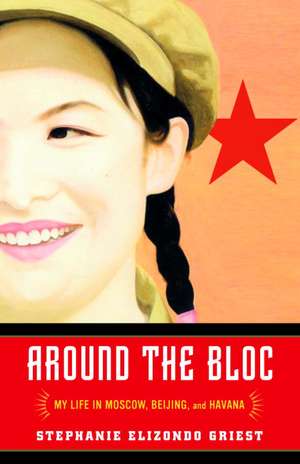Around the Bloc: My Life in Moscow, Beijing, and Havana
Autor Stephanie Elizondo Griesten Limba Engleză Paperback – 29 feb 2004
In Around the Bloc, Griest relates her experiences as a volunteer at a children’s shelter in Moscow, a propaganda polisher at the office of the Chinese Communist Party’s English-language mouthpiece in Beijing, and a belly dancer among the rumba queens of Havana. She falls in love with an ex-soldier who narrowly avoided radiation cleanup duties at Chernobyl, hangs out with Cuban hip-hop artists, and comes to difficult realizations about the meaning of democracy.
is the absorbing story of a young journalist driven by a desire to witness the effects of Communism. Along the way, she learns the Russian mathematical equation for buying dinner-party vodka (one bottle per guest, plus an extra), stumbles upon Beijing’s underground gay scene, marches with 100,000 mothers demanding Elián González’s return to Cuba, and gains a new appreciation for the Mexican culture she left behind.
Preț: 137.94 lei
Nou
Puncte Express: 207
Preț estimativ în valută:
26.39€ • 27.63$ • 21.84£
26.39€ • 27.63$ • 21.84£
Carte disponibilă
Livrare economică 15-29 martie
Preluare comenzi: 021 569.72.76
Specificații
ISBN-13: 9780812967609
ISBN-10: 0812967607
Pagini: 416
Dimensiuni: 138 x 199 x 23 mm
Greutate: 0.36 kg
Editura: Villard Books
ISBN-10: 0812967607
Pagini: 416
Dimensiuni: 138 x 199 x 23 mm
Greutate: 0.36 kg
Editura: Villard Books
Notă biografică
STEPHANIE ELIZONDO GRIEST has written for The New York Times, The Washington Post, the Associated Press, Latina, and Travelers’ Tales. As a national correspondent for The Odyssey, an educational website for kids, she once drove forty-five thousand miles across America, documenting its history. She now runs an anticensorship activist organization called the Youth Free Expression Network out of New York City. Visit her website at www.aroundthebloc.com.
Extras
1. Moscow Manifesto
FROM EACH ACCORDING TO HIS ABILITIES, TO EACH ACCORDING TO HIS NEEDS.
—Karl Marx
They say the first rule of traveling is packing only what you can carry for half a mile at a dead run. I had every intention of doing this back home in Texas, but my barest essentials filled two huge suitcases and a potbellied backpack. While I could not actually carry all seventy pounds of my luggage, I could push and shove it for small distances. So that’s what I did at Sheremetyevo Airport, from passport control to baggage claim to customs. Beyond the exit gate was a mob of onlookers who exuded my first whiffs of Moscow: a scent of equal parts vodka and sausage, leather and tobacco, sweat and strife. For one brief moment, the crowd’s collective attention focused on me, taking in my lumberjack hiking boots, Michelin man down coat, and wire-rimmed glasses. “Inostranka,” they murmured my nickname for the next half year. Foreign girl. Then the beefy guys in tracksuits and gold chains turned back to their cell phones, the fashionable girls—impeccably dressed in floor-length furs, knee-high riding boots, and fluffy hats—lit up another round of slender cigarettes, and everyone else resumed their stoic stances. I navigated in, around, and through them and emerged smelling vaguely of sausages.
Seeing no other place to sit in the concourse, I plopped down on the floor beside my fortress of luggage to wait for the other exchange students in my group. Within an instant, an ancient woman was hovering over me. She wore thick woolen tights beneath her layers of housedresses and hand-knit sweaters; her silver hair was covered with a brightly colored kerchief. Russians call these walking, talking historical artifacts babushki, or grandmothers. When I grinned at her, she latched on to my forearm with an iron grip and plucked me up. “The ground is too cold to sit on. You’ll freeze your ovaries,” she scolded, then shuffled away so I could ponder the damage done to my unborn children.
Five bleary-eyed Texans soon joined me. Gerad, who was returning for his second semester, ventured outside to look for the van scheduled to meet us at noon. The rest of us—who hadn’t slept in thirty-two hours—collapsed in a heap. After an hour had passed, I joined Gerad in the parking lot. “Where do you think our driver is?”
“Passed out on the couch at the dorm,” he replied, then pulled out a wad of rubles and handed me a 10,000 note. “Why don’t you call Nadezhda?”
Nadezhda was the Muscovite I’d befriended two years before, during her exchange program at my university in Texas. When we’d talked earlier that week, she’d promised to meet me at either the airport or the dormitory, depending on her work schedule. She’d know what to do—if I could find her. I wandered back inside the airport and found a smoky room with a row of plastic red phones stacked atop a counter. Transactions appeared to go through a sour-faced woman seated behind a desk, so I got in line behind three burly men with olive skin and five o’clock shadows. When one cordially asked how to call T’bilisi, the operator glowered. “The instructions are written on the wall! Can’t you read?”
The Georgians mumbled their apologies and ambled over to the phones. Then the woman set her ice-pick eyes on me. I dropped the 10,000-ruble note on her desk and darted off to the nearest phone before she could yell. True to her word, the instructions were pasted on the plexiglass partition, but I couldn’t decipher more than two consecutive words. Hoping for the best, I simply picked up the receiver and dialed Nadezhda’s work number. A woman answered after a few rings.
“Allo? . . . Allo?”
“Hello?” I asked in Russian.
“Allo? . . . Allo!”
“Hello, is Nadezhda there?”
“Allo? . . . Allo! . . . Gospodi!” Then she hung up. It seemed she never heard me.
I got back in line, this time behind a handsome young couple who paid for their phone call, split the change, and walked out the door without ever unlocking their lips.
“It didn’t work,” I told the operator.
Pursing her lips so tightly they disappeared, she asked why I hadn’t followed the instructions written in plain Russian on the wall. After I explained that I was somewhat illiterate in her language, she grunted and told me to press something—only I didn’t catch what—when I heard a voice. Then she shooed me away.
I returned to the phone and tried again. This time when the woman answered, I pressed nine, as that’s what usually gets punched in America. She still couldn’t hear me, though, so I pressed one, then zero. Nothing. I started pushing all the buttons frantically. She hung up.
I took a deep breath and retreated to the line.
“Why didn’t you press three?” the operator bellowed.
“Why three?” I asked plaintively, then returned to the phones.
This time no one answered at Nadezhda’s office, and I let it ring a long, long time, my index finger hovering over the three key. Feeling strangely defeated, I retrieved Gerad’s rubles and headed back to my posse. How was I going to survive in a country where I couldn’t even make a phone call?
Another two and a half hours passed.
“Well, guys, it looks like the welcome wagon ain’t coming,” Gerad broke the news. The options that followed were gloomy. The airport was located in the northernmost tip of the city; our dormitory was south of center. The Mafiya-controlled taxi cartel would charge about $70 a head—a price none of us could afford. Public transportation was cheap, but how could we get twenty-one pieces of luggage on and off buses that didn’t come to complete stops? The only other option was for Gerad to return to the dormitory alone and try to find our driver—meaning the rest of us would have another two- or three-hour wait.
We were about to vote when I heard my Russian name, Stesha, shouted across the concourse. I turned to see Nadezhda running toward me. I whooped for joy, but something stopped me from jumping into her outstretched arms. Last time I saw my friend, she looked like me: hair bedraggled, Levi’s ripped, feet sandaled, nose pierced. Now she was draped in fur and riding boots and sported a sleek new haircut.
“You’ve changed,” I breathed.
“You haven’t,” she quipped before throwing her arms around me.
Nadezhda had spent the past hour and a half waiting on a couch back at the dorm. When she realized the man crashed out beside her was our driver, she woke him up.
“He’s got a hangover, but he’s waiting right outside!” she announced cheerfully.
We piled our quarter ton of luggage into the van and clambered aboard. The van lurched out of the congested parking lot and joined the throngs of trams, trolleys, buses, Ladas, and bulletproof Mercedes-Benzes belching exhaust onto the snowbanked highway. Mile after mile of concrete apartment blocs whizzed past, each so randomly placed, it seemed Big Brother had dropped them from the sky. Women chatted on park benches; old men shared dried fish and beer over tree stumps. Kids wore so many layers of winter clothing, their limbs stuck out like a starfish’s. Fat gray crows flitted about in pencil-thin trees; the dogs being walked beneath them were, without exception, big, mean, and ugly. (That whole year, I never saw a dog smaller or gentler than a Rottweiler.)
As we approached downtown, the past century of Rus- sian history came into view. After seventy years of exile, prerevolutionary Moscow was slowly rearing its regal head again, its cathedrals and monasteries receiving full-scale face lifts while its onion-shaped gold domes shimmered in the sun. On the socialist side, ruby red stars crested buildings so massive, they seemed to have been built by titans instead of men. Capitalism had recently seized the skyline in the form of high-rise banks and chic new department stores.
Suddenly, the driver cut across three lanes of traffic to parallel-park beside a whitewashed cathedral with kelly green and electric orange trim. Our new home was the six-story dormitory across the street. We lugged our suitcases up to the lobby, where two guys in jeans and sneakers dozed on the couch in front of the television set. They turned out to be the security guards. During a commercial break, one strolled over to survey the mountain of luggage forming in the foyer.
“The elevator is broken,” he said, yawning, and returned to his spot on the couch.
“What floor is our room on?” I asked Gerad.
“The fifth.”
Nadezhda took that as her cue to leave. “I’ll come see you soon,” she promised with a hug and a kiss, then turned on her leather riding boots and left.
I had practiced being Russian a long time before moving there. I put cabbage in my tacos instead of shredded lettuce and ate lots of beets. I weaned myself off spices and drowned everything in sour cream. I devoured Russian literature, memorized Pushkin, and sang along to Vladimir Visotsky, the Soviet Union’s Bob Dylan. I made the arduous switch from tequila to vodka when I went out at night. I even opted for a non-air-conditioned suite at my group house in college. That’s suicide in central Texas heat, but I thought it would build the character I needed for Moscow.
It didn’t. Nothing could have prepared me for that student dormitory.
I could handle the fact that our room was on the fifth floor and the elevators never worked. I could live with the chronic lightbulb shortage that left the stairwells and hallways pitch black after sunset. I didn’t mind that our wallpaper peeled off in strips, or that our curtain covered only a fourth of the window and our room faced dead east, or that our room was infested with flies. One might assume insects die in Russia’s harsh winters, but they actually just migrate into student dormitories. They hovered over our heads as we brushed our teeth. They circled our skillets when we made spaghetti. They crawled up our noses as we slept. I was once the kind of person who carefully scooped up insects that strayed indoors and carried them outside to the bushes. But within a week of those flies, I joined my roommates’ declaration of war. Our first line of defense was a gooey roll of flypaper, which we attempted to suspend from a light fixture with an upside-down hanger. We ran into it more than the flies, however, so we soon made a nightly ritual of shutting the door, closing the window, rolling up some Pravda, and going on a killing spree. We became so adept, we sometimes murdered two with one blow.
I could also deal with our bathtub situation. We converted it into a shower by suspending its spray nozzle from another hanger and some masking tape, but our lack of a curtain—or shower rod—meant we either flooded the room when we stood or froze our asses against the porcelain when we sat. (We would all return home to Texas with quads of steel after so many months of squatting.) Our toilet had a room of its own that was so small, we banged our knees against the door when we straddled the pot. Someone hung a portrait of Gogol at eye level, and to this day I associate the literary master with bowel movements.
I didn’t even mind our kitchen. Each floor in the dormitory had an oven and two stoves, but only seven of the burners in the whole dorm worked properly. One was on our floor, but our Romanian neighbors were always boiling their beets on it. The kitchens were also home to little cockroaches that—like the flies—periodically peeked over our skillets to see what we were cooking. We were constantly scooping them out and chucking them onto the floor, which grew crunchy as the semester progressed.
Truth is, I rather enjoyed this lack of amenities, as it forced us to be resourceful and inventive—qualities you just can’t acquire while living in privilege. We made shelves by yanking off the doors of the cabinets and hanging them on the wall with nails and string. A rope, a bucket, and an empty corner sufficed as our laundry room; we hung our perishables out the window into the icebox of winter. The gaping hole in the ceiling where microphones once recorded late night conversations was our ready reminder of how Soviet life used to be. Gerad said that, back in the day, exchange students used to stand on chairs and bid the bugs spokounii nochi—good night—before they went to sleep.
What I couldn’t hack in my new home was the cot. The pillow was the width of a pantyliner; the mattress was only marginally thicker than the old army blanket that covered it. Both were smelly and stained. But I probably could have handled even this if it hadn’t been for the bedsprings, which bored little holes all over my body. I lost so much sleep, my left eye started twitching. After two sleepless weeks, I sat down for a seri- ous talk with my roommate, Kandy. A native Texan with the Big Hair to prove it—long, strawberry blond, and corkscrew curly—Kandy had financed her entire college education bartending at Tejano and kicker bars and roared around Austin in a fire-engine red sports car. She spoke Russian with a twang but could talk Turgenev like a scholar. She couldn’t take our sleeping situation, either, and had already dreamed up a plan.
The second floor of the dormitory doubled as a hotel, and its rooms were rumored to be far nicer than ours on the fifth, with full-length curtains and chairs with cushions. They also had maid service. That last element was key, as it meant a way in when the guests were out. For the next few days, Kandy and I lingered in the stairwell, noting the housekeeper’s every move. First she changed the bedsheets and tossed the soiled linens out the door. Next she emptied the trash. Then she dumped a pail of disinfectant onto the floor, splashed it around with a mop, and headed on to the next room, leaving the doors open so they could air out. Most important, tucked in a hallway out of view from the main corridor were three spare rooms that took her about fifteen minutes to clean.
We would have to act with speed and accuracy.
I had never stolen a thing in my life but decided this didn’t count. As Proudhon liked to say, “Property is theft.” Liberat- ing a mattress was a step toward greater class equality; I could justify my actions in Marxist terms if pressed. Kandy and I took off our hiking boots, put on our tapochki—slippers—and crouched in the stairwell as the housekeeper shuffled in and out of the rooms. We waited until she turned the far corner to work on the three hidden rooms, and the instant the disinfectant splashed on the floor we darted into the room nearest the stairwell. Not only was it wallpapered, it had a television set and sofa. Now I really felt no guilt. Kandy went to one bed, I the other. I flung back the bedspread and discovered the same paltry mattress that covered my own cot—except there were four.
“From each according to his abilities, to each according to his needs,” I muttered as I pulled out the middle two and covered the remaining two with the bedspread. Kandy took three. We rolled them into bundles along with the fresh linens and crept toward the door.
I heard it first—the clip-clop of the komandanka’s orthopedic shoes, coming down the stairwell. The superintendent of the dormitory, the komandanka was the in-house tyrant. She crashed all our parties and sent our guests home. She made the hired help cry. Rent raised at her whim. Dubbed “the Poison Dwarf” by exchange students long ago, she was now coming to inspect the housekeeping. My heart leaped into my throat as we made a break for the bathroom and hid behind the door. The footsteps came closer and paused by our doorway. My heart pounded so furiously, I felt light-headed; Kandy’s freckles disappeared in a flush.
Were thieves still sent to Siberia in post-Soviet Russia? Would we be summarily denounced? Would she force us to do a self-criticism in front of the other residents?
After the longest thirty seconds of my life, the Poison Dwarf turned on her heels and clip-clopped down the hall. Kandy slipped out of the bathroom to keep watch, then motioned me to follow. We ran for the stairwell with our billowy bundles, flew up five flights of stairs, burst into our room, and slammed the door triumphantly. I stripped off my army blanket and added the two new mattresses and linens. Kandy kicked off her tapochki and looked at me. I nodded.
We turned off the lights and slept for the next day and a half.
FROM EACH ACCORDING TO HIS ABILITIES, TO EACH ACCORDING TO HIS NEEDS.
—Karl Marx
They say the first rule of traveling is packing only what you can carry for half a mile at a dead run. I had every intention of doing this back home in Texas, but my barest essentials filled two huge suitcases and a potbellied backpack. While I could not actually carry all seventy pounds of my luggage, I could push and shove it for small distances. So that’s what I did at Sheremetyevo Airport, from passport control to baggage claim to customs. Beyond the exit gate was a mob of onlookers who exuded my first whiffs of Moscow: a scent of equal parts vodka and sausage, leather and tobacco, sweat and strife. For one brief moment, the crowd’s collective attention focused on me, taking in my lumberjack hiking boots, Michelin man down coat, and wire-rimmed glasses. “Inostranka,” they murmured my nickname for the next half year. Foreign girl. Then the beefy guys in tracksuits and gold chains turned back to their cell phones, the fashionable girls—impeccably dressed in floor-length furs, knee-high riding boots, and fluffy hats—lit up another round of slender cigarettes, and everyone else resumed their stoic stances. I navigated in, around, and through them and emerged smelling vaguely of sausages.
Seeing no other place to sit in the concourse, I plopped down on the floor beside my fortress of luggage to wait for the other exchange students in my group. Within an instant, an ancient woman was hovering over me. She wore thick woolen tights beneath her layers of housedresses and hand-knit sweaters; her silver hair was covered with a brightly colored kerchief. Russians call these walking, talking historical artifacts babushki, or grandmothers. When I grinned at her, she latched on to my forearm with an iron grip and plucked me up. “The ground is too cold to sit on. You’ll freeze your ovaries,” she scolded, then shuffled away so I could ponder the damage done to my unborn children.
Five bleary-eyed Texans soon joined me. Gerad, who was returning for his second semester, ventured outside to look for the van scheduled to meet us at noon. The rest of us—who hadn’t slept in thirty-two hours—collapsed in a heap. After an hour had passed, I joined Gerad in the parking lot. “Where do you think our driver is?”
“Passed out on the couch at the dorm,” he replied, then pulled out a wad of rubles and handed me a 10,000 note. “Why don’t you call Nadezhda?”
Nadezhda was the Muscovite I’d befriended two years before, during her exchange program at my university in Texas. When we’d talked earlier that week, she’d promised to meet me at either the airport or the dormitory, depending on her work schedule. She’d know what to do—if I could find her. I wandered back inside the airport and found a smoky room with a row of plastic red phones stacked atop a counter. Transactions appeared to go through a sour-faced woman seated behind a desk, so I got in line behind three burly men with olive skin and five o’clock shadows. When one cordially asked how to call T’bilisi, the operator glowered. “The instructions are written on the wall! Can’t you read?”
The Georgians mumbled their apologies and ambled over to the phones. Then the woman set her ice-pick eyes on me. I dropped the 10,000-ruble note on her desk and darted off to the nearest phone before she could yell. True to her word, the instructions were pasted on the plexiglass partition, but I couldn’t decipher more than two consecutive words. Hoping for the best, I simply picked up the receiver and dialed Nadezhda’s work number. A woman answered after a few rings.
“Allo? . . . Allo?”
“Hello?” I asked in Russian.
“Allo? . . . Allo!”
“Hello, is Nadezhda there?”
“Allo? . . . Allo! . . . Gospodi!” Then she hung up. It seemed she never heard me.
I got back in line, this time behind a handsome young couple who paid for their phone call, split the change, and walked out the door without ever unlocking their lips.
“It didn’t work,” I told the operator.
Pursing her lips so tightly they disappeared, she asked why I hadn’t followed the instructions written in plain Russian on the wall. After I explained that I was somewhat illiterate in her language, she grunted and told me to press something—only I didn’t catch what—when I heard a voice. Then she shooed me away.
I returned to the phone and tried again. This time when the woman answered, I pressed nine, as that’s what usually gets punched in America. She still couldn’t hear me, though, so I pressed one, then zero. Nothing. I started pushing all the buttons frantically. She hung up.
I took a deep breath and retreated to the line.
“Why didn’t you press three?” the operator bellowed.
“Why three?” I asked plaintively, then returned to the phones.
This time no one answered at Nadezhda’s office, and I let it ring a long, long time, my index finger hovering over the three key. Feeling strangely defeated, I retrieved Gerad’s rubles and headed back to my posse. How was I going to survive in a country where I couldn’t even make a phone call?
Another two and a half hours passed.
“Well, guys, it looks like the welcome wagon ain’t coming,” Gerad broke the news. The options that followed were gloomy. The airport was located in the northernmost tip of the city; our dormitory was south of center. The Mafiya-controlled taxi cartel would charge about $70 a head—a price none of us could afford. Public transportation was cheap, but how could we get twenty-one pieces of luggage on and off buses that didn’t come to complete stops? The only other option was for Gerad to return to the dormitory alone and try to find our driver—meaning the rest of us would have another two- or three-hour wait.
We were about to vote when I heard my Russian name, Stesha, shouted across the concourse. I turned to see Nadezhda running toward me. I whooped for joy, but something stopped me from jumping into her outstretched arms. Last time I saw my friend, she looked like me: hair bedraggled, Levi’s ripped, feet sandaled, nose pierced. Now she was draped in fur and riding boots and sported a sleek new haircut.
“You’ve changed,” I breathed.
“You haven’t,” she quipped before throwing her arms around me.
Nadezhda had spent the past hour and a half waiting on a couch back at the dorm. When she realized the man crashed out beside her was our driver, she woke him up.
“He’s got a hangover, but he’s waiting right outside!” she announced cheerfully.
We piled our quarter ton of luggage into the van and clambered aboard. The van lurched out of the congested parking lot and joined the throngs of trams, trolleys, buses, Ladas, and bulletproof Mercedes-Benzes belching exhaust onto the snowbanked highway. Mile after mile of concrete apartment blocs whizzed past, each so randomly placed, it seemed Big Brother had dropped them from the sky. Women chatted on park benches; old men shared dried fish and beer over tree stumps. Kids wore so many layers of winter clothing, their limbs stuck out like a starfish’s. Fat gray crows flitted about in pencil-thin trees; the dogs being walked beneath them were, without exception, big, mean, and ugly. (That whole year, I never saw a dog smaller or gentler than a Rottweiler.)
As we approached downtown, the past century of Rus- sian history came into view. After seventy years of exile, prerevolutionary Moscow was slowly rearing its regal head again, its cathedrals and monasteries receiving full-scale face lifts while its onion-shaped gold domes shimmered in the sun. On the socialist side, ruby red stars crested buildings so massive, they seemed to have been built by titans instead of men. Capitalism had recently seized the skyline in the form of high-rise banks and chic new department stores.
Suddenly, the driver cut across three lanes of traffic to parallel-park beside a whitewashed cathedral with kelly green and electric orange trim. Our new home was the six-story dormitory across the street. We lugged our suitcases up to the lobby, where two guys in jeans and sneakers dozed on the couch in front of the television set. They turned out to be the security guards. During a commercial break, one strolled over to survey the mountain of luggage forming in the foyer.
“The elevator is broken,” he said, yawning, and returned to his spot on the couch.
“What floor is our room on?” I asked Gerad.
“The fifth.”
Nadezhda took that as her cue to leave. “I’ll come see you soon,” she promised with a hug and a kiss, then turned on her leather riding boots and left.
I had practiced being Russian a long time before moving there. I put cabbage in my tacos instead of shredded lettuce and ate lots of beets. I weaned myself off spices and drowned everything in sour cream. I devoured Russian literature, memorized Pushkin, and sang along to Vladimir Visotsky, the Soviet Union’s Bob Dylan. I made the arduous switch from tequila to vodka when I went out at night. I even opted for a non-air-conditioned suite at my group house in college. That’s suicide in central Texas heat, but I thought it would build the character I needed for Moscow.
It didn’t. Nothing could have prepared me for that student dormitory.
I could handle the fact that our room was on the fifth floor and the elevators never worked. I could live with the chronic lightbulb shortage that left the stairwells and hallways pitch black after sunset. I didn’t mind that our wallpaper peeled off in strips, or that our curtain covered only a fourth of the window and our room faced dead east, or that our room was infested with flies. One might assume insects die in Russia’s harsh winters, but they actually just migrate into student dormitories. They hovered over our heads as we brushed our teeth. They circled our skillets when we made spaghetti. They crawled up our noses as we slept. I was once the kind of person who carefully scooped up insects that strayed indoors and carried them outside to the bushes. But within a week of those flies, I joined my roommates’ declaration of war. Our first line of defense was a gooey roll of flypaper, which we attempted to suspend from a light fixture with an upside-down hanger. We ran into it more than the flies, however, so we soon made a nightly ritual of shutting the door, closing the window, rolling up some Pravda, and going on a killing spree. We became so adept, we sometimes murdered two with one blow.
I could also deal with our bathtub situation. We converted it into a shower by suspending its spray nozzle from another hanger and some masking tape, but our lack of a curtain—or shower rod—meant we either flooded the room when we stood or froze our asses against the porcelain when we sat. (We would all return home to Texas with quads of steel after so many months of squatting.) Our toilet had a room of its own that was so small, we banged our knees against the door when we straddled the pot. Someone hung a portrait of Gogol at eye level, and to this day I associate the literary master with bowel movements.
I didn’t even mind our kitchen. Each floor in the dormitory had an oven and two stoves, but only seven of the burners in the whole dorm worked properly. One was on our floor, but our Romanian neighbors were always boiling their beets on it. The kitchens were also home to little cockroaches that—like the flies—periodically peeked over our skillets to see what we were cooking. We were constantly scooping them out and chucking them onto the floor, which grew crunchy as the semester progressed.
Truth is, I rather enjoyed this lack of amenities, as it forced us to be resourceful and inventive—qualities you just can’t acquire while living in privilege. We made shelves by yanking off the doors of the cabinets and hanging them on the wall with nails and string. A rope, a bucket, and an empty corner sufficed as our laundry room; we hung our perishables out the window into the icebox of winter. The gaping hole in the ceiling where microphones once recorded late night conversations was our ready reminder of how Soviet life used to be. Gerad said that, back in the day, exchange students used to stand on chairs and bid the bugs spokounii nochi—good night—before they went to sleep.
What I couldn’t hack in my new home was the cot. The pillow was the width of a pantyliner; the mattress was only marginally thicker than the old army blanket that covered it. Both were smelly and stained. But I probably could have handled even this if it hadn’t been for the bedsprings, which bored little holes all over my body. I lost so much sleep, my left eye started twitching. After two sleepless weeks, I sat down for a seri- ous talk with my roommate, Kandy. A native Texan with the Big Hair to prove it—long, strawberry blond, and corkscrew curly—Kandy had financed her entire college education bartending at Tejano and kicker bars and roared around Austin in a fire-engine red sports car. She spoke Russian with a twang but could talk Turgenev like a scholar. She couldn’t take our sleeping situation, either, and had already dreamed up a plan.
The second floor of the dormitory doubled as a hotel, and its rooms were rumored to be far nicer than ours on the fifth, with full-length curtains and chairs with cushions. They also had maid service. That last element was key, as it meant a way in when the guests were out. For the next few days, Kandy and I lingered in the stairwell, noting the housekeeper’s every move. First she changed the bedsheets and tossed the soiled linens out the door. Next she emptied the trash. Then she dumped a pail of disinfectant onto the floor, splashed it around with a mop, and headed on to the next room, leaving the doors open so they could air out. Most important, tucked in a hallway out of view from the main corridor were three spare rooms that took her about fifteen minutes to clean.
We would have to act with speed and accuracy.
I had never stolen a thing in my life but decided this didn’t count. As Proudhon liked to say, “Property is theft.” Liberat- ing a mattress was a step toward greater class equality; I could justify my actions in Marxist terms if pressed. Kandy and I took off our hiking boots, put on our tapochki—slippers—and crouched in the stairwell as the housekeeper shuffled in and out of the rooms. We waited until she turned the far corner to work on the three hidden rooms, and the instant the disinfectant splashed on the floor we darted into the room nearest the stairwell. Not only was it wallpapered, it had a television set and sofa. Now I really felt no guilt. Kandy went to one bed, I the other. I flung back the bedspread and discovered the same paltry mattress that covered my own cot—except there were four.
“From each according to his abilities, to each according to his needs,” I muttered as I pulled out the middle two and covered the remaining two with the bedspread. Kandy took three. We rolled them into bundles along with the fresh linens and crept toward the door.
I heard it first—the clip-clop of the komandanka’s orthopedic shoes, coming down the stairwell. The superintendent of the dormitory, the komandanka was the in-house tyrant. She crashed all our parties and sent our guests home. She made the hired help cry. Rent raised at her whim. Dubbed “the Poison Dwarf” by exchange students long ago, she was now coming to inspect the housekeeping. My heart leaped into my throat as we made a break for the bathroom and hid behind the door. The footsteps came closer and paused by our doorway. My heart pounded so furiously, I felt light-headed; Kandy’s freckles disappeared in a flush.
Were thieves still sent to Siberia in post-Soviet Russia? Would we be summarily denounced? Would she force us to do a self-criticism in front of the other residents?
After the longest thirty seconds of my life, the Poison Dwarf turned on her heels and clip-clopped down the hall. Kandy slipped out of the bathroom to keep watch, then motioned me to follow. We ran for the stairwell with our billowy bundles, flew up five flights of stairs, burst into our room, and slammed the door triumphantly. I stripped off my army blanket and added the two new mattresses and linens. Kandy kicked off her tapochki and looked at me. I nodded.
We turned off the lights and slept for the next day and a half.
Recenzii
"Stephanie Elizondo Griest has the soul of an adventurer, the heart of a child, the wit of a jester, and the mind of a wise old woman. Lucky for us, she also has a pen."
-Deborah Copaken Kogan, author of Shutterbabe
"A must-read for every student traveling or studying abroad. Griest’s four-year journey through communist capitol cities is an absorbing tale of political, social and personal discovery."
-Marybeth Bond, author Travelers' Tales: Gutsy Women; editor Travelers' Tales: A Woman's World
“A Chicana in China y mas? Who wouldn’t want to partake in Stephanie Elizondo Griest’s ongoing love affair with adventure? Unlike some travel stories where a smug author painfully tries to convince themselves (and their readers) how well they can adapt to foreign soil, Miss Stephanie, my dear beige sister, confesses full frontal vulnerability. She is the awkward tourist, the savvy traveler and…one hell of a writer! As long as there are books like this, one never needs to redeem mom’s frequent flyer points to experience true adventure!”
-Michele Serros, author of How to be a Chicana Role Model and Chicana Falsa
"Forget about J-school. Stephanie Elizondo Griest practices journalism the way it should be practiced. I wish I could have been hiding in her suitcase at each stop along her remarkable journey."
-Tom Miller, author of Trading with the Enemy: A Yankee Travels Through Castro's Cuba and The Panama Hat Trail
"A stunning first. Stephanie Elizondo Griest's memoir is a coming of age odyssey every American should read. Around the Bloc does more than tell a story. It vibrates with humor, insight and honesty -- a rare gem."
-Anchee Min, author of Red Azalea and Becoming Madame Mao
"A delightful and saucy romp through strange places and even stranger states of mind. Griest is not only an inspiration as a traveler and observer–she is darn funny too."
–James O'Reilly, author of Travelers' Tales
"Opening Around the Bloc is rather like popping the cork off a champagne bottle. This book fairly brims over with a refreshing zest and sparkle, which, one imagines, is probably an apt description of its author, as well. Stephanie Elizondo Griest, who embarked on her own Pilgrim’s Progress around the world’s greatest former (and current) communist capital cities, has written a delightful account of her curious journey. Full of humour, compassion and a great degree of personal candour, Around the Bloc is clearly just the beginning for this gifted young writer.”
-Jon Lee Anderson, author of The Lion’s Grave
-Deborah Copaken Kogan, author of Shutterbabe
"A must-read for every student traveling or studying abroad. Griest’s four-year journey through communist capitol cities is an absorbing tale of political, social and personal discovery."
-Marybeth Bond, author Travelers' Tales: Gutsy Women; editor Travelers' Tales: A Woman's World
“A Chicana in China y mas? Who wouldn’t want to partake in Stephanie Elizondo Griest’s ongoing love affair with adventure? Unlike some travel stories where a smug author painfully tries to convince themselves (and their readers) how well they can adapt to foreign soil, Miss Stephanie, my dear beige sister, confesses full frontal vulnerability. She is the awkward tourist, the savvy traveler and…one hell of a writer! As long as there are books like this, one never needs to redeem mom’s frequent flyer points to experience true adventure!”
-Michele Serros, author of How to be a Chicana Role Model and Chicana Falsa
"Forget about J-school. Stephanie Elizondo Griest practices journalism the way it should be practiced. I wish I could have been hiding in her suitcase at each stop along her remarkable journey."
-Tom Miller, author of Trading with the Enemy: A Yankee Travels Through Castro's Cuba and The Panama Hat Trail
"A stunning first. Stephanie Elizondo Griest's memoir is a coming of age odyssey every American should read. Around the Bloc does more than tell a story. It vibrates with humor, insight and honesty -- a rare gem."
-Anchee Min, author of Red Azalea and Becoming Madame Mao
"A delightful and saucy romp through strange places and even stranger states of mind. Griest is not only an inspiration as a traveler and observer–she is darn funny too."
–James O'Reilly, author of Travelers' Tales
"Opening Around the Bloc is rather like popping the cork off a champagne bottle. This book fairly brims over with a refreshing zest and sparkle, which, one imagines, is probably an apt description of its author, as well. Stephanie Elizondo Griest, who embarked on her own Pilgrim’s Progress around the world’s greatest former (and current) communist capital cities, has written a delightful account of her curious journey. Full of humour, compassion and a great degree of personal candour, Around the Bloc is clearly just the beginning for this gifted young writer.”
-Jon Lee Anderson, author of The Lion’s Grave















